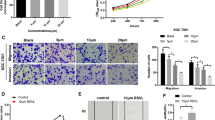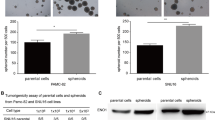Abstract
The tumor microenvironment (TM) is an essential factor of tumor progression. Mesenchymal stem cells (MSCs) are important components of the TM and play critical roles in cancer metastasis. Resveratrol (RES) is a potential antitumor drug that has attracted extensive attention. However, it remains unclear whether RES can exert its antitumor activity by targeting MSCs located in the TM. In this study, we demonstrated that the conditioned medium of gastric-cancer-derived MSCs (GC–MSCs) promoted gastric cancer (GC) metastasis and facilitated the progression of epithelialmesenchymal transition (EMT) of GC cells. However, after pretreatment with RES, the prometastatic effect of GC–MSCs on GC cells was reversed. Furthermore, RES reduced GC–MSC (IL-6, IL-8, MCP-1, VEGF) gene expression and protein secretion, and counteracted the activation of the GC–MSC-induced Wnt/β-catenin signaling of GC cells, with less β-catenin nuclear transport and declined expression of β-catenin, CD44, and CyclinD3 in GC cells. Re-expression of β-catenin impaired the inhibitory effect of RES on GC cells. In conclusion, RES restricted the mobility increase of GC cells and reversed the progress of EMT induced by GC–MSCs by inactivating the Wnt/β-catenin signaling. GC–MSCs are promising target for RES in the inhibition of GC metastasis.






Similar content being viewed by others
Abbreviations
- GC:
-
Gastric cancer
- GC–MSCs:
-
Gastric-cancer-derived mesenchymal stem cells
- RES:
-
Resveratrol
- GC–MSC–CM:
-
Conditioned medium of GC–MSCs
- RES0-CM:
-
Conditioned medium of GC–MSCs pretreated with 0.4 ‰ DMSO for 24 h
- RES20-CM:
-
Conditioned medium of GC–MSCs pretreated with 20 µM RES for 24 h
References
Bray F, Ferlay J, Soerjomataram I, Siegel RL, Torre LA, Jemal A. Global cancer statistics 2018: GLOBOCAN estimates of incidence and mortality worldwide for 36 cancers in 185 countries. CA Cancer J Clin. 2018;68:394–424.
Li Z, Gao X. Looking back 2018–focused on gastric cancer. Zhonghua Wei Chang Wai Ke Za Zhi. 2019;22:1–8.
Van Cutsem E, Sagaert X, Topal B, Haustermans K, Prenen H. Gastric cancer. Lancet. 2016;388:2654–64.
Shi Y, Du L, Lin L, Wang Y. Tumour-associated mesenchymal stem/stromal cells: emerging therapeutic targets. Nat Rev Drug Discov. 2017;16:35–52.
Su S, Chen J, Yao H, Liu J, Yu S, Lao L, et al. CD10+GPR77+cancer-associated fibroblasts promote cancer formation and chemoresistance by sustaining cancer stemness. Cell. 2018;172(841–56):e16.
Wang Z, Dabrosin C, Yin X, Fuster MM, Arreola A, Rathmell WK, et al. Broad targeting of angiogenesis for cancer prevention and therapy. Semin Cancer Biol. 2015;35:S224–S243.
Qian BZ, Pollard JW. Macrophage diversity enhances tumor progression and metastasis. Cell. 2010;141:39–51.
Zhu Q, Zhang X, Zhang L, Li W, Wu H, Yuan X, et al. The IL-6-STAT3 axis mediates a reciprocal crosstalk between cancer-derived mesenchymal stem cells and neutrophils to synergistically prompt gastric cancer progression. Cell Death Dis. 2014;5:e1295.
Cao H, Xu W, Qian H, Zhu W, Yan Y, Zhou H, et al. Mesenchymal stem cell-like cells derived from human gastric cancer tissues. Cancer Lett. 2009;274:61–71.
Xu X, Zhang X, Wang S, Qian H, Zhu W, Cao H, et al. Isolation and comparison of mesenchymal stem-like cells from human gastric cancer and adjacent non-cancerous tissues. J Cancer Res Clin Oncol. 2011;137:495–504.
Huang F, Wang M, Yang T, Cai J, Zhang Q, Sun Z, et al. Gastric cancer-derived MSC-secreted PDGF-DD promotes gastric cancer progression. J Cancer Res Clin Oncol. 2014;140:1835–48.
Li W, Zhou Y, Yang J, Zhang X, Zhang H, Zhang T, et al. Gastric cancer-derived mesenchymal stem cells prompt gastric cancer progression through secretion of interleukin-8. J Exp Clin Cancer Res. 2015;34:52.
Chao SC, Chen YJ, Huang KH, Kuo KL, Yang TH, Huang KY, et al. Induction of sirtuin-1 signaling by resveratrol induces human chondrosarcoma cell apoptosis and exhibits antitumor activity. Sci Rep. 2017;7:3180.
Jing X, Cheng W, Wang S, Li P, He L. Resveratrol induces cell cycle arrest in human gastric cancer MGC803 cells via the PTEN-regulated PI3K/Akt signaling pathway. Oncol Rep. 2016;35:472–8.
Zulueta A, Caretti A, Signorelli P, Ghidoni R. Resveratrol: A potential challenger against gastric cancer. World J Gastroenterol. 2015;21:10636–43.
Brabletz T. EMT and MET in metastasis: Where are the cancer stem cells? Cancer Cell. 2012;22:699–701.
Yang K, Wang X, Zhang H, Wang Z, Nan G, Li Y, et al. The evolving roles of canonical WNT signaling in stem cells and tumorigenesis: implications in targeted cancer therapies. Lab Invest. 2016;96:116–36.
Galluzzi L, Spranger S, Fuchs E, Lopez-Soto A. WNT Signaling in Cancer Immunosurveillance. Trends Cell Biol. 2019;29:44–65.
Paget S. The distribution of secondary growths in cancer of the breast. 1889. Cancer Metastasis Rev. 1989;8:98–101.
Deus CM, Serafim TL, Magalhaes-Novais S, Vilaca A, Moreira AC, Sardao VA, et al. Sirtuin 1-dependent resveratrol cytotoxicity and pro-differentiation activity on breast cancer cells. Arch Toxicol. 2017;91:1261–78.
Cai H, Scott E, Kholghi A, Andreadi C, Rufini A, Karmokar A, et al. Cancer chemoprevention: evidence of a nonlinear dose response for the protective effects of resveratrol in humans and mice. Sci Transl Med. 2015;7:298ra117.
Kurayoshi M, Oue N, Yamamoto H, Kishida M, Inoue A, Asahara T, et al. Expression of Wnt-5a is correlated with aggressiveness of gastric cancer by stimulating cell migration and invasion. Cancer Res. 2006;66:10439–48.
Funding
This work was supported by the National Natural Science Foundation of China (81572075, 81702429), Natural Science Foundation of Jiangsu Province (BK20170561), Graduate Research and Innovation Projects of Jiangsu Province (KYCX17_1819), Practical innovation training program for college students of Jiangsu University (201810299579W) and Postdoctoral Research Foundation of China (2016M591791).
Author information
Authors and Affiliations
Contributions
LY, RZ and HQ designed and performed the research, and conducted data analysis and manuscript writing; YH, and ZL performed the apoptosis analysis and Transwell migration assay; WL and MW performed the western blot; and ZS, RJ, and WX provided technical guidance. All authors have read and approved the final manuscript for publication.
Corresponding author
Ethics declarations
Conflict of interest
The authors declare that they have no competing interests.
Ethical approval
All procedures performed in studies involving animals were in accordance with the ethical standards of the medical ethics committee of Jiangsu University and with the 1964 Helsinki Declaration and its later amendments or comparable ethical standards. The study were approved by the medical ethics committee of Jiangsu University (2012258).
Informed consent
Informed consent was obtained from all individual participants included in the study.
Additional information
Publisher's Note
Springer Nature remains neutral with regard to jurisdictional claims in published maps and institutional affiliations.
Rights and permissions
About this article
Cite this article
Yin, L., Zhang, R., Hu, Y. et al. Gastric-cancer-derived mesenchymal stem cells: a promising target for resveratrol in the suppression of gastric cancer metastasis. Human Cell 33, 652–662 (2020). https://doi.org/10.1007/s13577-020-00339-5
Received:
Accepted:
Published:
Issue Date:
DOI: https://doi.org/10.1007/s13577-020-00339-5




